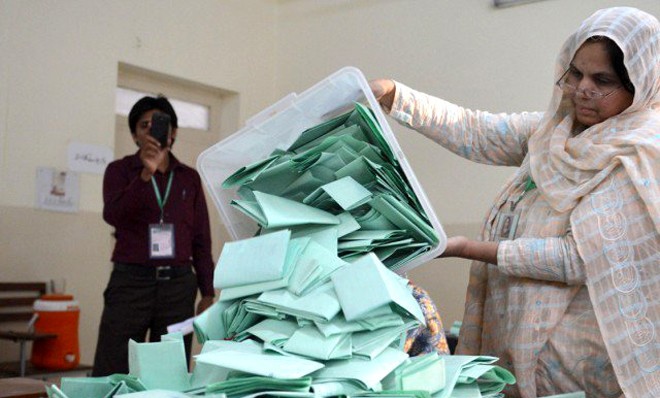
In Dir the JI lost the by-polls to the PPP for the first time in 47 years

Two important consequences emerged from the recently held by-polls in Dir region. First, the defeat of the Jamaat-e-Islami (JI) in its traditional stronghold and resurgence of the Pakistan People’s Party (PPP) there. The other was participation of women in electoral process for the first time.
Situated in Malakand Division, Dir region is administratively divided into two districts -- Upper Dir and Lower Dir. Before it was incorporated in Pakistan in 1969, Dir was governed as a princely state. The JI, except when they boycotted the elections, has been winning the elections in Dir region since the 1970s. Muhammad Raza, an Islamabad-based political analyst who monitors KP politics closely, says other political parties, such as the PPP, have challenged them, yet, the JI’s vote bank in Dir has remained intact. "In the country, it is the only place where the JI wins easily," he says.
There are many factors behind the strengthening of the JI in Dir. Sahibzada Sufi Inayatur Rehman introduced and organised the JI in 1963 in the entire Dir state when enforcement of Frontier Crime Regulation (FCR), along with the local customary laws, prohibited political activities in the state. After Dir’s incorporation in Pakistan, members of Sahibzada family have been elected in polls from the region till now.
A section of analysts believe that the JI in Dir was strengthened intentionally because of its close proximity with the Kunar province of Afghanistan. "Afghan Jihad has pumped in a lot of money to strengthen the JI in Dir as it was ideologically the sister organisation of Gulbadin Hekmatyar’s Hizb-e-Islami," Raza tells TNS.
In the recent by-polls held on September 15, the PPP’s candidate Sahibzada Sanaullah, who was a former JI member, won the by-election for seat PK-93 in Upper Dir district, defeating the JI for the first time in the last 47 years. According to unofficial results, Sanaullah polled 21,850 votes while JI’s Malik Azam got 16,000 votes. The seat had fallen vacant after Malik Behram Khan of the JI was disqualified by the Election Tribunal for possessing a fake degree. His son Malik Azam was given the JI ticket to contest the by-election.
In recent polls, the ruling Pakistan Tehreek-e-Insaf (PTI) and Qaumi Watan Party announced to support the JI while the PPP’s candidate was supported by three key opposition parties -- the Awami National Party, Jamiat Ulema-e-Islam-Fazl and Pakistan Muslim League-Nawaz.
However, the JI Dir leadership has criticised the PTI for supporting the PPP’s candidate in the polls and demanded the party’s central leadership to bring the issue to the attention of the PTI’s leadership. "It is the second time the PTI has not supported the JI in the by-polls in Dir region," says Azam. "The PTI’s local leaders openly supported the JI’s rivals in violation of the KP leadership’s decision."
The PPP claimed the victory in the by-polls from Dir shows resurgence of the party in the KP. Analysts term it a wrong assumption. "Looking at the previous results, the JI’s votes in the by-polls are far less than the combined votes of the four parties, which shows they have lost their vote bank," says Raza.
However, the situation on ground was different and internal rift within the JI played a key role in the defeat of its own candidate. Talking to TNS, JI’s lower cadre leaders complain the JI in Dir has been following in the footsteps of other traditional parties such as the PPP and the PML-N, where family politics influence, instead of ideologies.
"Dir’s Sahibzadas have complete control of the party in the region. In the JI, people secretly supported Sanaullah who is their relative, instead of the JI candidate," a JI leader tells TNS. He also says that instead of taking action against a leader who lied to the party by presenting fake degree, the party leadership violated party’s basic principles and awarded ticket to his son. For the first time in the JI’s history in Dir, party cadres have been questioning leadership over favouritism in distributing jobs and contracts, the party’s insiders say.
At the same time, allowing women to exercise their voting right in by-polls is a positive development as politics was a men-only affair in the conservative region of Dir. Women had not cast their votes since 1970. Even in by-polls in neighbouring PK-95 in Dir in May this year on a seat vacated by the JI’s central chief Sirajul Haq on being elected senator, not a single woman came out to vote. There are 5,300 registered women voters here.
In recent by-polls, a large number of women cast their votes. Women rights activists and local analysts say political parties who were earlier accused of not allowing women to vote, have actively encouraged them to cast their votes this time. "We kept emphasising that it is the duty of political parties to convince women to vote the way they do canvassing with male voters," says Shad Begum, a prominent social activist from Dir. "PK-93 by-polls is now an example of it when the PPP and the JI showed interest and mobilised women votes this time. The result is in front of you".